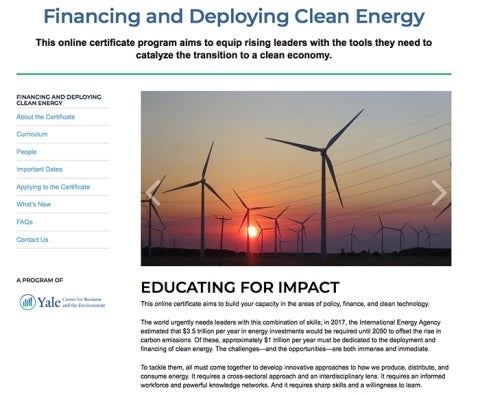Note: Yale School of the Environment (YSE) was formerly known as the Yale School of Forestry & Environmental Studies (F&ES). News articles and events posted prior to July 1, 2020 refer to the School's name at that time.
In 2019, two centers based at the Yale School of Forestry & Environmental Studies will introduce new online certificate programs that allow emerging professionals in countries across the world to access Yale’s faculty, training materials, and networks.
In “Tropical Forest Landscapes: Conservation, Restoration and Sustainable Use,” a one-year program developed by the Environmental Leadership & Training Initiative (ELTI), participants will learn to design, implement, and monitor effective forest conservation and restoration initiatives.
“Financing and Deploying Clean Energy,” a separate program developed by the Yale Center for Business and the Environment, will aim to accelerate the uptake of clean energy by building workforce capacity in the areas of policy, finance, and technology.
Both programs — which will combine online training from Yale faculty and guest experts from industry, peer feedback, and opportunities for in-person training — will begin in the summer of 2019. Applications for each program will be accepted beginning in January 2019.
In “Tropical Forest Landscapes: Conservation, Restoration and Sustainable Use,” a one-year program developed by the Environmental Leadership & Training Initiative (ELTI), participants will learn to design, implement, and monitor effective forest conservation and restoration initiatives.
“Financing and Deploying Clean Energy,” a separate program developed by the Yale Center for Business and the Environment, will aim to accelerate the uptake of clean energy by building workforce capacity in the areas of policy, finance, and technology.
Both programs — which will combine online training from Yale faculty and guest experts from industry, peer feedback, and opportunities for in-person training — will begin in the summer of 2019. Applications for each program will be accepted beginning in January 2019.

The programs represent two of the three pilot certificate initiatives campus-wide that have received support from the Yale Poorvu Center for Teaching and Learning. The third, an 18-week program created by the Yale School of Public Health, shares tools on the health impacts of climate change. The CBEY program is jointly offered by the Yale School of Management (SOM). In addition, SOM’s Executive Education program has pioneered new flexible online learning opportuntities in a variety of key areas, including online programs that help professionals foster diversity and inclusion and online tools that help women make the leap to executive leadership.
“These online certificate programs will help equip practitioners and decision-makers around the world with the knowledge and skills needed to be effective leaders,” said F&ES Dean Indy Burke. “We’re excited that F&ES is at the center of this campus-wide initiative that is putting forward our world-class community of professors and researchers to advance transformative change.”
Learn more:“Tropical Forest Landscapes” | “Financing and Deploying Clean Energy”
The “Tropical Forest Landscapes” program — which is aimed for professionals working on forest conservation or restoration projects in the tropical world — builds on the School’s and ELTI’s extensive training experience and networks throughout the tropical world.
“As competing land use practices escalate in tropical forest landscapes, it is imperative that people who manage and influence these regions are equipped with the knowledge and skillsets needed to support these vital functions and services into the future,” said Eva Garen, director of ELTI. “Time is of the essence, as tropical forests continue to be deforested and degraded at alarming rates.”
“These online certificate programs will help equip practitioners and decision-makers around the world with the knowledge and skills needed to be effective leaders,” said F&ES Dean Indy Burke. “We’re excited that F&ES is at the center of this campus-wide initiative that is putting forward our world-class community of professors and researchers to advance transformative change.”
Learn more:“Tropical Forest Landscapes” | “Financing and Deploying Clean Energy”
The “Tropical Forest Landscapes” program — which is aimed for professionals working on forest conservation or restoration projects in the tropical world — builds on the School’s and ELTI’s extensive training experience and networks throughout the tropical world.
“As competing land use practices escalate in tropical forest landscapes, it is imperative that people who manage and influence these regions are equipped with the knowledge and skillsets needed to support these vital functions and services into the future,” said Eva Garen, director of ELTI. “Time is of the essence, as tropical forests continue to be deforested and degraded at alarming rates.”

Over the past 12 years, ELTI has implemented 150 courses reaching nearly 7,000 environmental leaders from more than 75 countries. These initiatives include a model online training program, offered in five languages, that has reached a wide range of professionals working in countries across the world.
But while those online short courses typically cover only six weeks, this program will enable participants to take four eight-week courses over a year, in addition to an optional one-week field course.
“It’s exciting to think about how much ground we can cover in a year,” said Karin Bucht, a program associate for ELTI’s online training program. “In addition to learning about the concepts and the theory, participants will be able to apply these issues by developing their own project plans with peer feedback and expert guidance.”
With 5 to 6 hours of work per week, the program allows individuals to balance coursework with their careers. Participants will also have the opportunity to craft their own conservation and restoration initiative, which can include projects, policies, business plans, or programs of any scale.
“We need professionals who are equipped to face the complex nature of land management,” said Gillian Bloomfield, coordinator of ELTI’s online training program. “This program equips participants with practical solutions grounded in cutting-edge science on ecology, social dynamics, and financial aspects of conservation and restoration.”
CBEY’s program is targeted at working professionals who are passionate about clean energy and want to advance their careers by gaining new skills in finance, technology, and policy, and mitigate climate change.
“As in all things climate right now, the critical issue is not just how but how fast we reach scale,” said Vero Bourg-Meyer, program director for clean energy and conservation finance at CBEY. “We need a workforce that uses the power of markets and finance in spurring innovation, and can participate in policymaking in a way that is both effective and inclusive.
But while those online short courses typically cover only six weeks, this program will enable participants to take four eight-week courses over a year, in addition to an optional one-week field course.
“It’s exciting to think about how much ground we can cover in a year,” said Karin Bucht, a program associate for ELTI’s online training program. “In addition to learning about the concepts and the theory, participants will be able to apply these issues by developing their own project plans with peer feedback and expert guidance.”
With 5 to 6 hours of work per week, the program allows individuals to balance coursework with their careers. Participants will also have the opportunity to craft their own conservation and restoration initiative, which can include projects, policies, business plans, or programs of any scale.
“We need professionals who are equipped to face the complex nature of land management,” said Gillian Bloomfield, coordinator of ELTI’s online training program. “This program equips participants with practical solutions grounded in cutting-edge science on ecology, social dynamics, and financial aspects of conservation and restoration.”
CBEY’s program is targeted at working professionals who are passionate about clean energy and want to advance their careers by gaining new skills in finance, technology, and policy, and mitigate climate change.
“As in all things climate right now, the critical issue is not just how but how fast we reach scale,” said Vero Bourg-Meyer, program director for clean energy and conservation finance at CBEY. “We need a workforce that uses the power of markets and finance in spurring innovation, and can participate in policymaking in a way that is both effective and inclusive.

“We need people to better understand the interplay of the financial, technological, and socioeconomic drivers in financing and deploying clean energy. And this new program is built to do just that.”
The curriculum is a hybrid of both online and in-person interaction, consisting of a foundational pre-course, a week on Yale’s campus, and four sequential core online courses.
The five-week pre-course kicks off in July 2019 and will be entirely self-paced. A week-long introductory program on Yale’s campus follows in August, with the first of four eight-week online courses beginning immediately thereafter.
The four core courses — which will cover clean energy policy, technology transitions, renewable energy project finance, and innovation — will run from August to May. Each weekly module will require watching up to one hour of pre-recorded multimedia, participating in one hourlong live virtual class, and up to three hours of related coursework.
“The expertise in building the market for renewable energy is incredibly strong at Yale, and we are excited to bring it to a broader audience,” said Stuart DeCew, executive director of CBEY. “From our world-class faculty to our network of top-of-their-game professionals, bringing their knowledge to bear on this new certificate is truly educating for impact.”
The priority admissions deadline for both programs is March 7, 2019.
The curriculum is a hybrid of both online and in-person interaction, consisting of a foundational pre-course, a week on Yale’s campus, and four sequential core online courses.
The five-week pre-course kicks off in July 2019 and will be entirely self-paced. A week-long introductory program on Yale’s campus follows in August, with the first of four eight-week online courses beginning immediately thereafter.
The four core courses — which will cover clean energy policy, technology transitions, renewable energy project finance, and innovation — will run from August to May. Each weekly module will require watching up to one hour of pre-recorded multimedia, participating in one hourlong live virtual class, and up to three hours of related coursework.
“The expertise in building the market for renewable energy is incredibly strong at Yale, and we are excited to bring it to a broader audience,” said Stuart DeCew, executive director of CBEY. “From our world-class faculty to our network of top-of-their-game professionals, bringing their knowledge to bear on this new certificate is truly educating for impact.”
The priority admissions deadline for both programs is March 7, 2019.
Tropical Forest Landscapes: Conservation, Restoration & Sustainable Use

In this one-year program, developed by the Environmental Leadership and Training Initiative, participants will learn to design, implement and monitor effective conservation and restoration initiatives. Visit the Tropical Forests Landscapes certificate website, or contact tropicalcertificate@yale.edu with questions.
Both programs launched in the summer of 2019.
Financing and Deploying Clean Energy
 Developed by the Yale Center for Business and the Environment, this program aims to accelerate the uptake of clean energy by building capacity in the workforce in the areas of policy, finance, and technology. Visit the Financing and Deploying Clean Energy certificate website for more details, or contact cbey.certificate@yale.edu with questions.
Developed by the Yale Center for Business and the Environment, this program aims to accelerate the uptake of clean energy by building capacity in the workforce in the areas of policy, finance, and technology. Visit the Financing and Deploying Clean Energy certificate website for more details, or contact cbey.certificate@yale.edu with questions.
Published
December 13, 2018